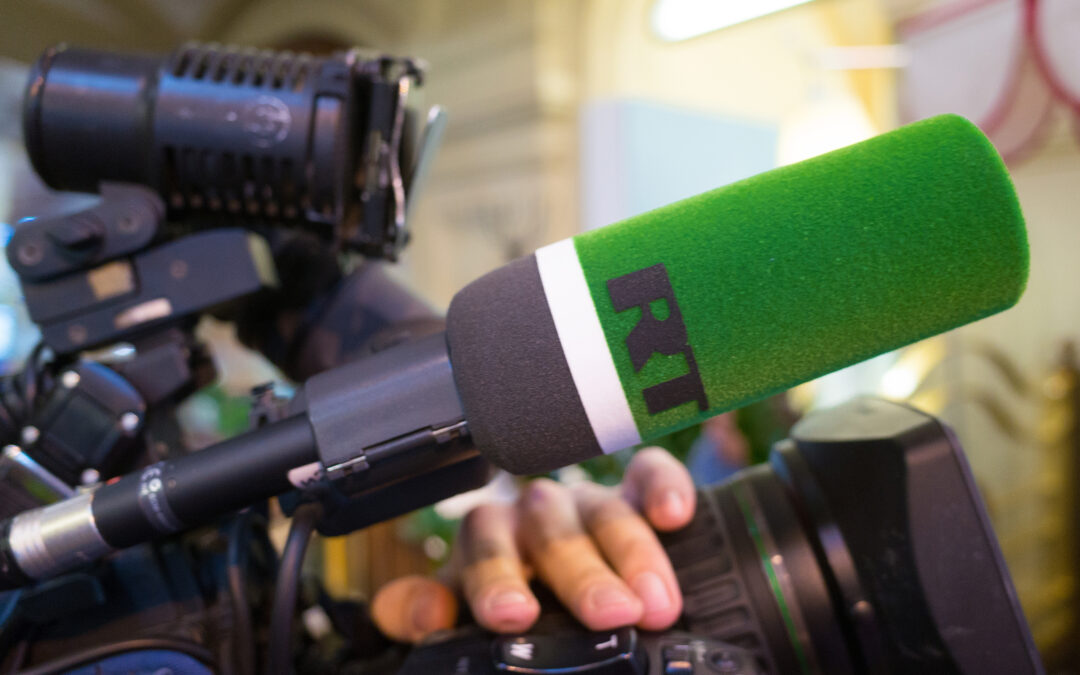Germany and Russia have traded blows over the two countries’ international broadcasters.
On Wednesday 2 February 2022, the German Commission on Licensing and Supervision (ZAK) decreed that RT must cease broadcasting German-language programmes saying it “does not have the necessary broadcasting licence”.
RT DE – the Berlin-based German-language division of RT (formerly Russia Today) acquired a licence from the Serbian media regulator on 17 December 2021. Both Germany and Serbia are signatories to the
European Convention on Transfrontier Television. Licences granted by one ECTT member state provide the legal grounds for transmission and reception of a licensed service in another ECTT-ratified state. However, Germany says that since the programmes are produced in Germany and not Serbia, the licence does not provide the right for the channel to be received in the country. RT has said that it will challenge this in the German courts.

The following day, 3 February, the Ministry of Foreign Affairs of the Russian Federation issued a
statement announcing that it is closing the operations of Germany’s international broadcaster
DW in the country (
headquarters in Bonn pictured).
The statement reads:
“As part of the response measures announced on February 2 in response to the unfriendly actions of the Federal Republic of Germany to ban satellite and other broadcasting of the German-language television channel RT DE, the Russian side intends to implement the first stage of response measures:
– closure of the correspondent office of the German television and radio company Deutsche Welle in the Russian Federation;
– cancellation of accreditation of all employees of the Russian Bureau of Deutsche Welle;
– termination of satellite and other broadcasting of the Deutsche Welle television and radio company on the territory of the Russian Federation;
– initiation by the competent authorities of the Russian Federation of the procedure for considering the issue of recognising Deutsche Welle as a foreign mass media outlet acting as a foreign agent;
– launching the process of forming a list of representatives of state and public structures of Germany involved in restricting the broadcasting of RT DE and otherwise putting pressure on the Russian media operator, who will be banned from entering the territory of the Russian Federation. The list is not expected to be published.
Information on the next steps in the response will be published in a timely manner.”
DW has issued a press statement about the Russian move. It quotes DW Director-General Peter Limbourg as saying: “The measures by the authorities in Russia are completely incomprehensible and a total overreaction,
“We have been made into a kind of pawn, which the media must often endure in autocracies. We formally protest against this absurd reaction by the Russian government and we will take legal action against the announced measures. Until we are officially presented with the measures, we will continue reporting from our office in Moscow. Even if we ultimately do have to close it, our reporting about Russia will remain unchanged. In fact, we would increase our coverage.”
According to the press statement, Deutsche Welle has held a broadcast license in Russia since 2005 for its DW English and DW German TV channels. The current licenses issued by Russia’s media authorities are valid until 2025 for DW English and until 2027 for DW German.
DW English is broadcast in Russia via the ASTRA-5B satellite. DW German is broadcast using the ASTRA-4A satellite. In line with the binding conditions of the license, the DW German TV channel has a window for Russian-language programming in its schedule. This programming consists of DW magazines adapted into Russian (a total of 18 hours per week: 2 hours per day, Mon.-Fri. and 4 hours per day, Sat.-Sun.). Several cable TV distributors in Russia also run the Russian-language programming of DW German. They are Rostelecom, Tricolor, Beeline, ER-Telecom, MTS and NetByNet.
Picture: The Foreign Ministry in Moscow

 “It is ironic that just the idea of a new TV news channel with a different voice appearing in Germany has made the local authorities, including the regulator MABB, so nervous and desperate, as to abandon their much-touted principles such as freedom of speech. Today, by once more threatening an independent production company that has nothing to do with RT DE’s entirely lawful and legitimate license to broadcast in Germany and other European countries, it was demonstrated that rules and regulations – including European conventions – and even the semblance of all logic, have been thrown out the window. By claiming that we are not responsible for our broadcasts here in Moscow MABB is ignoring facts, and painting a false reality to suit a clearly politically motivated threat.”
“It is ironic that just the idea of a new TV news channel with a different voice appearing in Germany has made the local authorities, including the regulator MABB, so nervous and desperate, as to abandon their much-touted principles such as freedom of speech. Today, by once more threatening an independent production company that has nothing to do with RT DE’s entirely lawful and legitimate license to broadcast in Germany and other European countries, it was demonstrated that rules and regulations – including European conventions – and even the semblance of all logic, have been thrown out the window. By claiming that we are not responsible for our broadcasts here in Moscow MABB is ignoring facts, and painting a false reality to suit a clearly politically motivated threat.”

 The following day, 3 February, the Ministry of Foreign Affairs of the Russian Federation issued a
The following day, 3 February, the Ministry of Foreign Affairs of the Russian Federation issued a